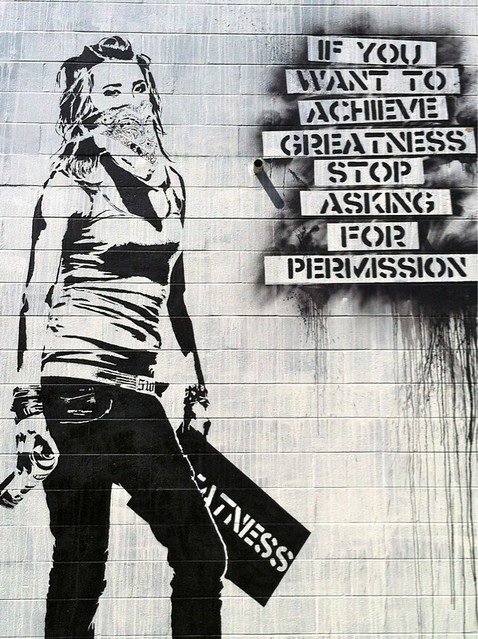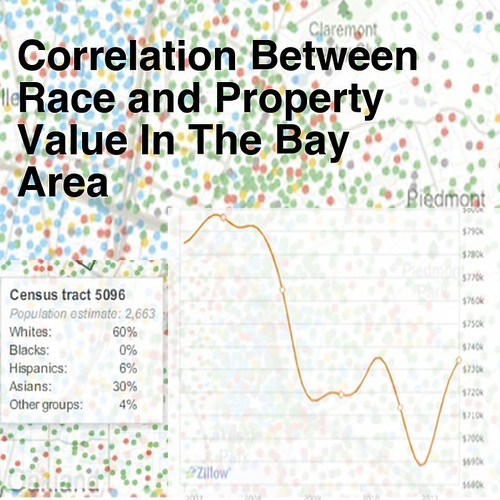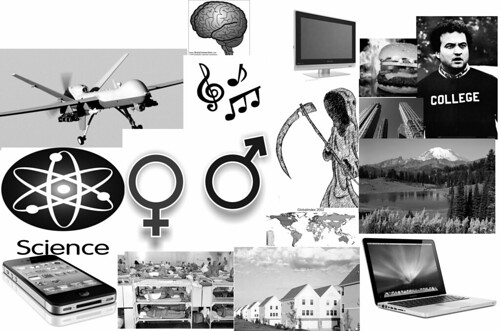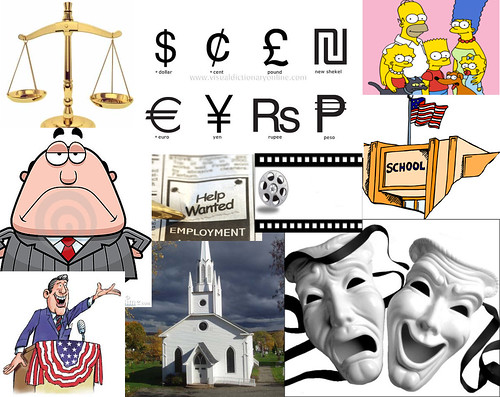I created this because I know that 99% of Americans lack the vocabulary necessary to engage in political discourse. This list obviously isn't comprehensive, but I'm OK with that. I hope that this post reaches someone who has the time to create a platform for occupiers to add definitions that are important to our struggle, so that the 99% can have a reliable resource to reference.
Anarchism: Anarchism is generally defined as the
political philosophy which holds the
state to be undesirable, unnecessary, and harmful,
[1][2] or alternatively as opposing
authority and
hierarchical organization in the conduct of human relations.
[3][4][5][6][7][8] Proponents of anarchism, known as "anarchists", advocate
stateless societies based on non-
hierarchical[3][9][10] voluntary associations.
[11][12]
There are many types and traditions of anarchism, not all of which are mutually exclusive.
Anarchy: Anarchy (from the
ancient Greek ἀναρχία,
anarchia,
meaning "absence of a leader"), has more than one definition. In the
United States, the term "anarchy" typically is meant to refer to a
society without a publicly enforced government or violently enforced
political authority.
[1][2] When used in this sense, anarchy may
[3] or may not
[4] be intended to imply political disorder or
lawlessness within a society.
Outside of the US, and by most individuals that self-identify as
anarchists, it implies a system of governance, mostly theoretical at a
nation state level although there are a few successful historical
examples,
[5]
that goes to lengths to avoid the use of coercion, violence, force and
authority, while still producing a productive and desirable society.
Austerity: In
economics, austerity is a
policy of
deficit-cutting, lower
spending, and a reduction in the amount of
benefits and
public services provided.
[1] Austerity policies are often used by governments to reduce their
deficit spending[2] while sometimes coupled with increases in
taxes to pay back
creditors to reduce debt.
Capital: In
economics, capital, capital goods, or real capital are those already-produced
durable goods that are used in production of
goods or
services. The capital goods are not significantly consumed, though they may
depreciate in the
production process. Capital is distinct from land in that capital
must itself be produced by human labor before it can be a factor of
production. At any moment in time, total physical capital may be
referred to as the capital stock (which is not to be confused with the
capital stock
of a business entity.) In a fundamental sense, capital consists of any
produced thing that can enhance a person's power to perform economically
useful work—a stone or an arrow is capital for a caveman who can use it
as a hunting instrument, and roads are capital for inhabitants of a
city. Capital is an input in the
production function. Homes and personal autos are not capital but are instead durable goods because they are not used in a production effort.
In
Marxian economics,
capital is used to buy something only in order to sell it again to
realize a financial profit, and for Marx capital only exists within the
process of economic exchange—it is
wealth that grows out of the process of circulation itself and forms the basis of the economic system of
capitalism.
Capitalism: Capitalism is generally considered a
philosophy of
economic systems that favor
private ownership of the
means of production, creation of goods or services for
profit or
income by
individuals or
corporations,
competitive markets,
voluntary exchange,
wage labor,
capital accumulation, and
personal finance.
Class: is a set of concepts in the
social sciences and
political theory centered on models of
social stratification in which people are grouped into a set of
hierarchical social categories. In common parlance, the term "social class," is usually synonymous with "
socio-economic
class," defined as: "people having the same social, economic, or
educational status," e.g., "the working class"; "an emerging
professional class."
Commune: is an
intentional community of people living together, sharing common interests,
property, possessions,
resources, and, in some communes,
work and
income.
Communism (from
Latin communis - common, universal) is a
revolutionary socialist movement to create a
classless, moneyless, and
stateless social order structured upon
common ownership of the
means of production, as well as a
social,
political and
economic ideology that aims at the establishment of this social order.
C
ooperative: is an
autonomous association of persons who
voluntarily cooperate for their mutual social, economic, and cultural benefit.
[1]
Cooperatives include non-profit community organizations and businesses
that are owned and managed by the people who use its services (a
consumer cooperative) and/or by the people who work there (a worker
cooperative).
Various aspects regarding cooperative enterprise are the focus of study in the field of
cooperative economics.
Deregulation: is when government reduces its role and allows industry greater freedom in how it operates
Externality: In
economics, an externality, or transaction spillover, is a cost or benefit that is not transmitted through prices
[1] and is incurred by a party who did not agree to the action causing the cost or benefit.
Gender: is a range of characteristics used to distinguish between
males and
females, particularly in the cases of
men and
women and the
masculine and
feminine attributes that they possess. Depending on the context, the discriminating characteristics vary from
sex to
social role to
gender identity.
International Monetary Fund: The International Monetary Fund (
IMF) is an
international organization that was created on July 22, 1944 at the
Bretton Woods Conference and came into existence on December 27, 1945 when 29 countries signed the Articles of Agreement
[1]. Countries contribute money to a pool through a quota system from which
countries with payment imbalances can borrow funds on a temporary basis.
Marxism: Marxism is an economic and sociopolitical worldview and method of socioeconomic inquiry that centers upon a
materialist interpretation of history, a
dialectical view of social change, and an analysis and critique of the development of
capitalism. Marxism was pioneered in the early to mid 19th century by two
German philosophers,
Karl Marx and
Friedrich Engels. Marxism encompasses
Marxian economic theory, a
sociological theory and a
revolutionary view of social change that has influenced political movements around the world.
[
Manufacturing Consent: Using the
propaganda model,
Manufacturing Consent posits that
corporate-owned
news mass communication media — print, radio, television — are businesses subject to commercial competition for advertising revenue and
profit.
As such, their distortion (editorial bias) of news reportage — i.e.
what types of news, which items, and how they are reported — is a
consequence of the profit motive that requires establishing a stable,
profitable business; therefore, news businesses favoring profit over the
public interest
succeed, while those favoring reportorial accuracy over profits fail,
and are relegated to the margins of their markets (low sales and
ratings).
Means of Production: Means of production refers to physical, non-human inputs used in production—the factories, machines, and tools used to produce wealth
[1] — along with both
infrastructural capital and
natural capital. This includes the
classical factors of production minus
financial capital and minus
human capital. They include two broad categories of objects:
instruments of labour (tools, factories,
infrastructure,
etc.) and
subjects of labour
(natural resources and raw materials). People operate on the subjects
of labour, using the instruments of labour, to create a product; or,
stated another way, labour acting on the means of production creates a
product.
[2]
When used in the broad sense, the "means of production" includes the
"means of distribution" which includes stores, banks, and railroads.
Nationalization: is the process of taking an industry or assets into
government ownership by a national government or state.
[1] Nationalization usually refers to private assets, but may also mean assets owned by lower levels of government, such as
municipalities, being transferred to the
public sector to be operated and owned by the state.
Neoliberalism: is a
contemporary political movement advocating
economic liberalizations,
free trade and
open markets. Neoliberalism supports the
privatization of
nationalized industries,
deregulation, and enhancing the role of the
private sector in modern
society. It is commonly informed by
neoclassical or
Austrian economics.
The central pillars of neoliberalism are the market and the
individual.The central neoliberal goal is to 'roll back the frontiers of
the state', in the belief that unregulated market capitalism will
deliver efficiency, growth and widespread prosperity for all. In this
view the 'dead hand' of the state saps initiative and discourages
enterprise; government, however well-intentioned, invariably has a
damaging effect upon human affairs. This is reflected in the liberal New
Right's concern with the politics of ownership and its preference for
private enterprise over nationalisation. Such ideas are associated with
Margaret Thatcher and
Ronald Reagan.
Thatcher viewed the 'nanny-state' as breeding a culture of dependency
and undermining freedom - freedom that is understood as freedom of
choice in the marketplace.
[1] The
term neoliberal today is often used as a
general condemnation of economic liberalization
policies and advocates.
Open Market: In a general sense used in
economics and
political economy,
an open market refers to a market which is accessible to all economic
actors. In an open market so defined, all economic actors have an equal
opportunity of entry in that market. This contrasts with a protected
market in which entry is conditional on certain financial and legal
requirements or which is subject to
tariff barriers, taxes, levies or state
subsidies which effectively prevent some economic actors from participating in them (see [protectionism]).
Permaculture: is a branch of
ecological design and
ecological engineering, which develop
sustainable human settlements and self-maintained
agricultural systems modeled from natural
ecosystems.
[1][2]
The core values of permaculture are:
- Care of the Earth: Provision for all life systems to continue and multiply.
- Care of People: Provision for people to access those resources necessary for their existence
- Setting Limits to Population and Consumption: By governing our own needs, we can set resources aside to further the above principles.[3][4]
Permaculture design emphasizes patterns of landscape, function, and
species assemblies. It asks the question, “Where does this (element) go?
How can it be placed for the maximum benefit of the system?" To answer
this question, the central concept of permaculture is maximizing useful
connections between components and
synergy
of the final design. The focus of permaculture, therefore, is not on
each separate element, but rather on the relationships created among
elements by the way they are placed together; the whole becoming
greater than the sum of its parts.
Production: In
economics, production is the act of creating
output, a
good or service which has
value and contributes to the
utility of individuals.
Socialism  /ˈsoʊʃəlɪzəm/
/ˈsoʊʃəlɪzəm/ is an
economic system characterised by
social ownership and/or control of the
means of production and cooperative management of the economy,
[1] and a
political philosophy advocating such a system. "Social ownership" may refer to any one of, or a combination of, the following:
cooperative enterprises,
common ownership, direct
public ownership or autonomous
state enterprises.
[2] There are many variations of socialism and as such there is no single definition encapsulating all of socialism.
[3] They differ in the type of social ownership they advocate, the degree to which they rely on
markets versus
planning, how management is to be organised within economic enterprises, and the role of the state in constructing socialism.
Social Contract: or political contract is an
intellectual construct that typically addresses two questions, first,
that of the origin of society, and second, the question of the
legitimacy of the authority of the
state over the
individual.
[1]
Social contract arguments typically posit that individuals have
consented, either explicitly or tacitly, to surrender some of their
freedoms and submit to the authority of the ruler or magistrate (or to
the decision of a majority), in exchange for protection of their
natural rights. The question of the relation between
natural and legal rights, therefore, is often an aspect of social contract theory.
State: A
state refers to a legal/political entity that is comprised
of the following: a) a permanent population; b) a defined territory; c)
a government ; and d) the capacity to enter into relations with other states.
Stock Market: or equity market is a public entity (a
loose network of economic transactions, not a physical facility or
discrete entity) for the trading of company
stock (
shares) and
derivatives at an agreed price; these are
securities listed on a
stock exchange as well as those only traded privately.
World Bank: The World Bank is an
international financial institution that provides
loans[3] to
developing countries for
capital programs.







